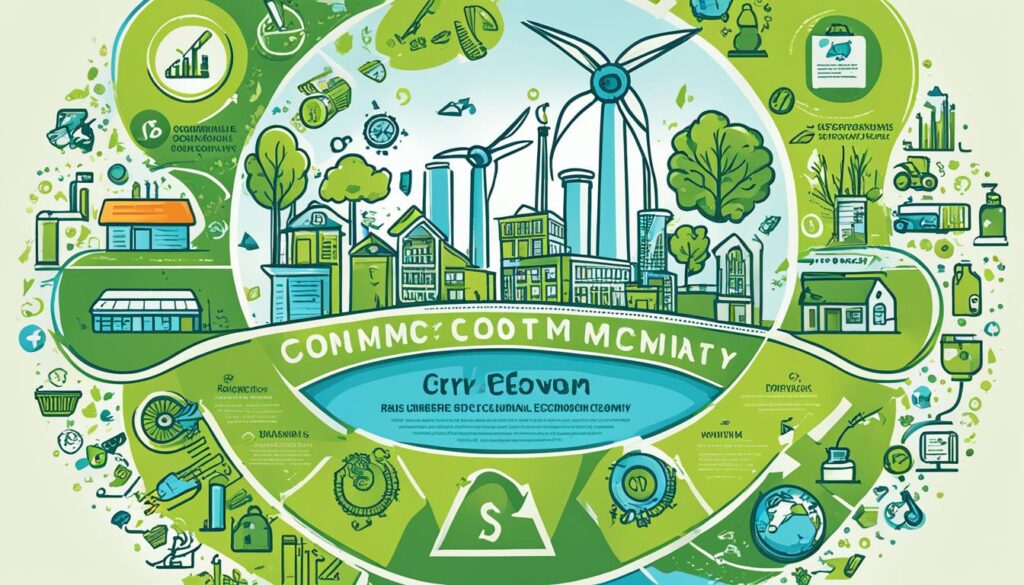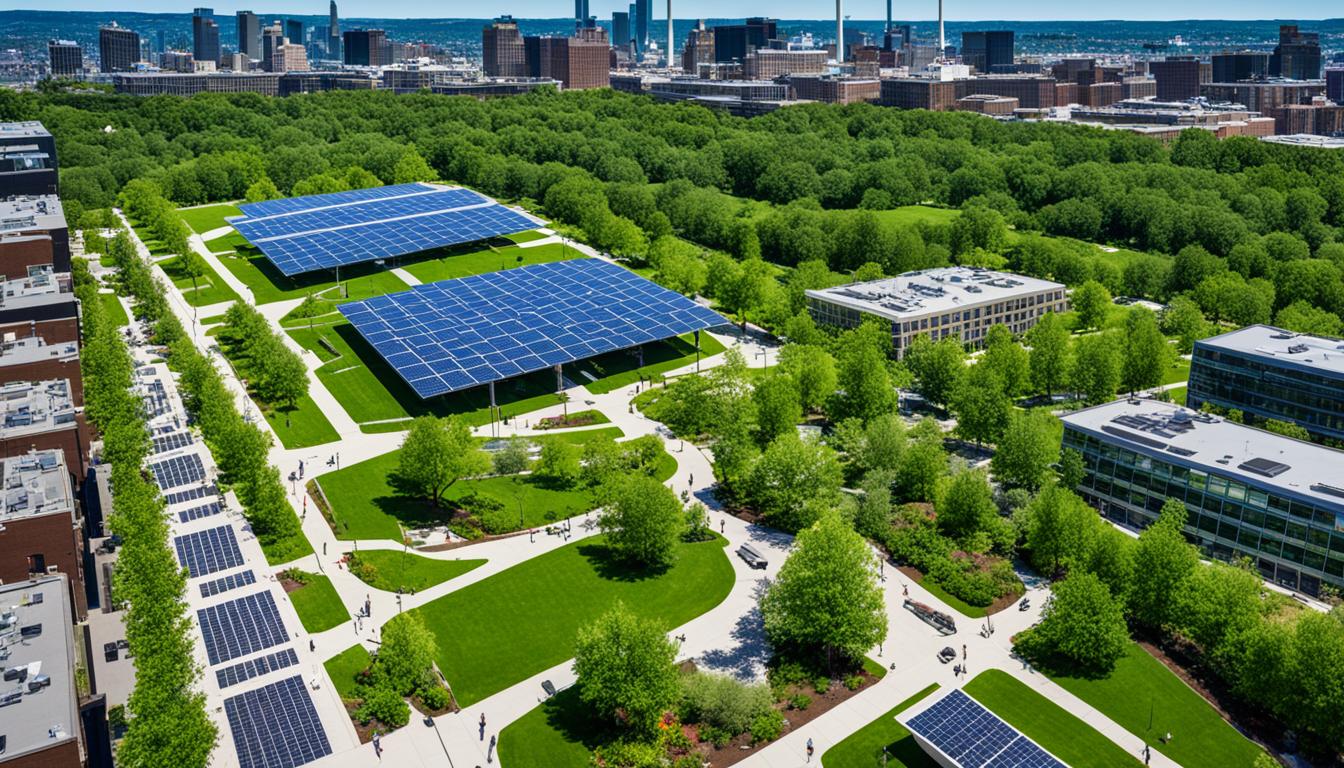Are you ready to shape a better future for our planet? Discover the essentials of sustainability and learn how you can embrace a greener future through eco-friendly practices and responsible business initiatives. Explore how sustainability goes beyond environmental conservation and encompasses economic growth and social equality. Let’s dive into the world of sustainability and uncover the secrets to a thriving and sustainable future.
Key Takeaways:
- Sustainability balances environmental conservation, economic growth, and social equality.
- Environmental sustainability focuses on preserving natural resources and reducing carbon emissions.
- Social sustainability promotes equality, well-being, and community engagement.
- Economic sustainability ensures responsible business practices and innovation for a sustainable future.
- Addressing sustainability challenges requires collective action and policy changes.
The Three Pillars of Sustainability
Sustainability rests upon three key pillars: environment, society, and economy. These pillars form the foundation for creating a greener and more sustainable future that prioritizes environmental conservation, social equality, and economic prosperity.
Environmental Sustainability
One of the essential pillars of sustainability is environmental sustainability. It focuses on preserving our natural resources, minimizing harm to the planet, and reducing carbon emissions. By adopting eco-friendly practices such as renewable energy, responsible consumption, and waste reduction, we can protect our ecosystems and create a more sustainable world.
Social Sustainability
Social sustainability emphasizes human rights, equality, and the well-being of communities. It recognizes the importance of building inclusive societies where everyone has access to education, healthcare, and equal opportunities. By promoting community engagement, embracing diversity, and addressing social inequalities, we can create a more equitable and thriving society.
Economic Sustainability
The third pillar of sustainability is economic sustainability, which ensures that current economic activities do not compromise the ability of future generations to meet their needs. This involves embracing responsible business practices, promoting sustainable development, and encouraging innovation aligned with sustainability goals. By balancing economic growth with environmental and social responsibility, we can create a prosperous and sustainable future.
By addressing these three pillars of sustainability – environmental, social, and economic – we can pave the way for a greener future that harmonizes our planet’s well-being, social justice, and economic progress.
Environmental Sustainability: Preserving Our Natural Resources
When it comes to environmental sustainability, preserving our natural resources takes center stage. It’s all about finding ways to protect the delicate balance of wildlife, ecosystems, and the planet itself, while still allowing for human activities and development. By adopting eco-friendly practices and responsible consumption, we can reduce our ecological footprint and contribute to a greener and more sustainable future.
“The true wealth of a nation lies in its overall environmental health and the sustainability of its natural resources.”
One key aspect of environmental sustainability is the reduction of carbon emissions. We need to take steps to minimize our reliance on fossil fuels and promote renewable energy sources. Embracing technologies like solar power, wind energy, and hydropower can significantly reduce our carbon footprint and mitigate the effects of climate change.
Additionally, responsible consumption plays a crucial role in environmental sustainability. By making conscious choices about the products we buy and the resources we use, we can help conserve natural resources and minimize waste. Opting for sustainable and renewable materials, recycling and reusing whenever possible, and supporting companies that prioritize environmental conservation are essential steps in achieving resource conservation.
Preserving our natural resources is not just a matter of environmental consciousness; it’s an investment in our own future. By taking proactive steps to reduce our carbon emissions, promote renewable energy, and practice responsible consumption, we can ensure that the beauty and abundance of our planet will be enjoyed by generations to come.
Social Sustainability: Equality and Well-being for All
Social sustainability plays a vital role in creating a society where equality, well-being, and community engagement thrive. By prioritizing social sustainability, we can foster an inclusive and supportive environment that benefits present and future generations.
At the heart of social sustainability lies the principle of equality. It encompasses the fair distribution of resources, opportunities, and rights among individuals and communities. Every person deserves equal access to education, healthcare, and social services, irrespective of their background or circumstances.
Embracing diversity is another essential aspect of social sustainability. In a diverse society, everyone’s unique perspectives and experiences are valued and respected, leading to a rich and vibrant community. By embracing diversity, we can create an environment where individuals feel included and can contribute their talents and ideas to societal progress.
Community Engagement: Empowering Local Initiatives
Community engagement is a key driver of social sustainability. It involves empowering local initiatives and fostering a sense of ownership and responsibility within communities. When people actively participate in decision-making processes and take pride in shaping their neighborhoods, a stronger sense of cohesion and commitment emerges.
Through community engagement, individuals can collectively address their community’s needs and aspirations. This collaborative effort strengthens social bonds, enhances trust, and results in the development of innovative solutions that benefit the entire community.
Education and Healthcare: Building Foundations for Well-being
Access to quality education and healthcare is fundamental to social sustainability. Education equips individuals with the knowledge and skills necessary to lead fulfilling lives and contribute positively to society. It promotes equal opportunities, empowers individuals, and breaks the cycle of poverty.
Similarly, healthcare plays a crucial role in ensuring the well-being of individuals and communities. Accessible and affordable healthcare services improve overall quality of life, reduce health disparities, and contribute to a healthier, more productive society.
“Social sustainability means creating an environment where every individual has equal opportunities and access to essential resources, where diversity is celebrated, and communities actively participate in decision-making processes.” – Jane Davis, Social Sustainability Advocate
By prioritizing social sustainability and actively working towards equality, well-being, community engagement, and access to education and healthcare, we can foster a society that values every individual, sustains thriving communities, and paves the way for a brighter future.

Economic Sustainability: Balancing Growth and Responsibility
Economic sustainability is a crucial aspect of creating a greener and more sustainable future. It emphasizes the importance of responsible business practices, sustainable development, innovation, and embracing the circular economy. By striking a balance between economic growth and environmental and social well-being, we can ensure a future that is economically prosperous, socially equitable, and environmentally conscious.
Responsible business practices play a key role in economic sustainability. Companies that prioritize sustainability in their operations and supply chains not only contribute to the well-being of the planet but also gain a competitive edge in the market. By incorporating eco-friendly practices, such as reducing waste and emissions, implementing renewable energy sources, and promoting ethical sourcing, businesses can drive positive change while maintaining profitability.
Sustainable development is another essential element of economic sustainability. It entails pursuing economic growth in a manner that does not deplete natural resources or harm the environment. Sustainable development considers the long-term consequences of economic activities, and aims to meet the needs of present and future generations. By adopting sustainable development strategies, economies can thrive while ensuring the preservation of the planet for the generations to come.
| Economic Sustainability Strategies | Benefits |
|---|---|
| 1. Implementing circular economy principles | – Reduces waste and promotes resource efficiency – Fosters innovation and new business opportunities |
| 2. Investing in clean technologies and renewable energy | – Reduces carbon emissions and reliance on fossil fuels – Stimulates job creation and economic growth in the renewable energy sector |
| 3. Promoting sustainable supply chains | – Enhances brand reputation and customer loyalty – Ensures ethical sourcing and fair labor practices |
| 4. Encouraging collaboration and knowledge sharing | – Drives innovation and fosters sustainable solutions – Enables the exchange of best practices and lessons learned |
Innovation plays a vital role in achieving economic sustainability. By fostering a culture of innovation, businesses can develop new technologies, products, and processes that align with sustainability goals. These innovations not only benefit the company but also contribute to the overall well-being of society and the environment. Embracing innovation enables us to find creative solutions to the challenges we face while propelling us towards a more sustainable future.
Lastly, the circular economy is an integral part of economic sustainability. It emphasizes the importance of reducing waste, reusing materials, and recycling resources. By transitioning from a linear “take-make-dispose” model to a circular economy, we can minimize resource consumption, reduce environmental impact, and create a more sustainable and resilient economy.

Image: A visual representation of the circular economy, highlighting the keyword “circular economy” related to economic sustainability.
Driving Positive Change Through Innovation: A Case Study
“Innovative solutions have the power to drive positive change and transform industries. Take the case of XYZ Company, a leader in sustainable packaging solutions. By developing innovative packaging materials made from recycled and renewable sources, XYZ Company has not only reduced environmental impact but also created a new market opportunity. With their commitment to sustainable innovation, XYZ Company demonstrates how economic sustainability and responsible business practices can go hand in hand, fostering both financial success and a greener future.” – Jane Smith, Sustainability Consultant
Economic sustainability is not just about economic growth; it is about building a future that is economically viable, socially equitable, and environmentally responsible. By embracing responsible business practices, sustainable development, innovation, and the circular economy, we can achieve a harmonious balance that benefits both current and future generations. Let us pave the way for a prosperous, fair, and sustainable future.
Overcoming Challenges to Sustainability
While sustainability is of utmost importance, there are several challenges that we must address in order to achieve a greener and more sustainable future.
Consumerism: The Age of Unrestrained Consumption
In today’s consumer-driven society, the pursuit of material possessions often takes precedence over sustainable practices. The constant desire for more leads to excessive resource consumption, waste generation, and environmental degradation. To overcome this challenge, we must promote conscious consumption, encouraging individuals to make informed choices and prioritize sustainable alternatives.
Resource Depletion: A Limited Planet
As the global population continues to grow, the demand for resources increases exponentially. The unsustainable extraction of natural resources, such as fossil fuels, minerals, and water, depletes our finite resources and harms ecosystems. We must adopt responsible resource management strategies, promote circular economy models, and invest in renewable energy sources to mitigate resource depletion and ensure a sustainable future.
Climate Change: An Urgent Global Crisis
The impacts of climate change, including rising temperatures, sea-level rise, and extreme weather events, pose a significant threat to our planet and its inhabitants. Addressing climate change requires ambitious action, such as reducing greenhouse gas emissions, transitioning to clean energy sources, and implementing climate-resilient infrastructure. We must prioritize climate action, both individually and collectively, to mitigate the devastating effects of climate change.
Inadequate Environmental Policies: Bridging the Gap
Ineffective or insufficient environmental policies hinder progress towards sustainability. Governments, organizations, and individuals need to advocate for strong and comprehensive environmental policies that promote sustainable practices, conservation efforts, and the integration of sustainability principles into decision-making processes. By bridging the gap between policy and action, we can create an enabling environment for sustainable development.
Limited Access to Education and Resources: Empowering Communities
Access to education and resources plays a crucial role in empowering individuals and communities to embrace sustainability. By improving access to quality education, raising awareness about environmental issues, and providing equal opportunities, we can foster a sense of responsibility and empower individuals to make sustainable choices. Additionally, equitable access to resources, such as clean water, healthcare, and renewable energy, is essential for creating a sustainable and just society.
“To overcome these sustainability challenges, we must work together, enact meaningful policy changes, and foster a shift in societal values towards sustainability.”
To overcome these sustainability challenges, we must work together, enact meaningful policy changes, and foster a shift in societal values towards sustainability. By prioritizing sustainable practices, we can pave the way for a brighter future—one that ensures the well-being of the planet and future generations.
Conclusion
Sustainability is not just a trendy buzzword; it is an imperative for creating a sustainable future that balances environmental conservation, social equality, and economic prosperity. The urgency to embrace sustainable practices has never been greater, as we face the challenges of climate change and resource depletion.
By prioritizing sustainability, we can mitigate the devastating impacts of climate change, preserve our natural resources, and protect the planet for future generations. Sustainable practices like reducing carbon emissions, promoting renewable energy, and practicing responsible consumption are all crucial steps towards a greener and more sustainable future.
Furthermore, sustainability goes beyond just environmental issues. It encompasses social equality, ensuring that everyone has access to education, healthcare, and equal opportunities. By promoting social sustainability, we can create a more inclusive and equitable society where all individuals thrive.
Lastly, economic sustainability is vital for long-term prosperity. By embracing responsible business practices and promoting innovation aligned with sustainability goals, we can achieve a balance between economic growth and social and environmental well-being.
It is up to each and every one of us to contribute to this collective effort. Together, we can build a world where sustainability is not an exception but the norm. Embracing sustainability is not just a choice; it is our responsibility to ensure a vibrant and green future for ourselves and future generations.



